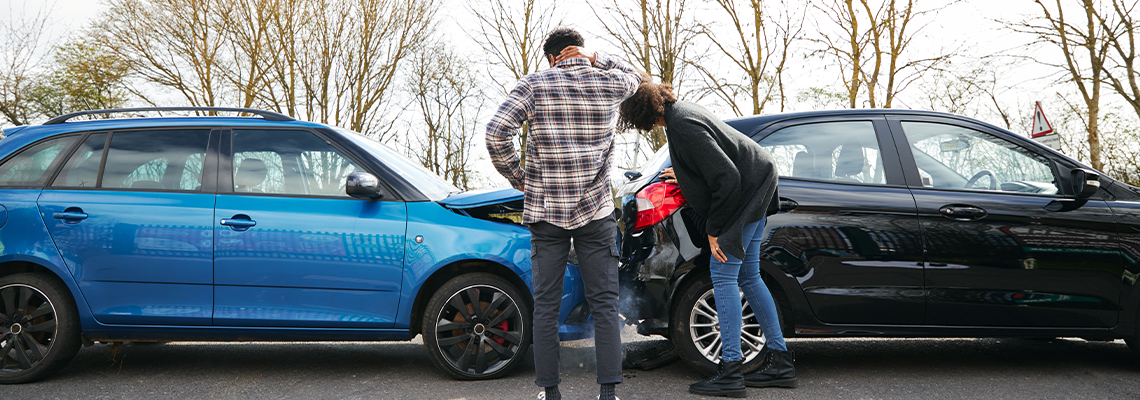When a collision with a commercial truck turns life upside down, the shock doesn’t fade quickly. Injuries can be severe, medical bills pile up fast, and work may suddenly feel out of reach.

What Should You Do Immediately After a Car Accident to Protect Your Claim?
Being involved in a car accident can be a disorienting and stressful experience. In Missouri, where specific laws govern car accident claims, taking the right steps immediately after a collision is critical to protecting your legal rights and confirming a strong insurance or personal injury claim.
SJP Sifers Jensen Palmer in Kansas City, Missouri, can help you with the essential actions to take following a car accident in Missouri. These actions focus on preserving evidence, complying with state laws, and safeguarding your potential claim. By acting promptly and strategically, you can avoid common pitfalls that could weaken your case.
Confirm Safety and Seek Medical Attention
Your immediate priority after a car accident is safety. If you or anyone else is injured, addressing medical needs is critical.
Check for injuries: Assess yourself and others for injuries. Even if you feel fine, adrenaline can mask pain, so be cautious. Common injuries like whiplash or concussions may not be immediately apparent.
Call 911: If anyone is injured or the accident involves significant property damage, call 911 to report the incident. Missouri law requires drivers to report accidents resulting in injury, death, or property damage exceeding $500 to the police (Missouri Revised Statutes § 300.110).
Move to safety: If possible and safe, move your vehicle to the side of the road to avoid blocking traffic or causing further accidents. Turn on hazard lights to alert other drivers. If the vehicle can’t be moved, exit the car and stand in a safe location away from traffic.
Seeking medical attention promptly isn’t only vital for your health but also for your claim. Medical records created shortly after the accident serve as evidence linking your injuries to the collision, which is crucial for insurance claims or lawsuits.
Notify Law Enforcement
In Missouri, you’re legally obligated to report certain accidents to the police. Contact law enforcement immediately if:
The accident results in injury or death.
Property damage exceeds $500.
The other driver is uninsured or flees the scene.
When police arrive, they’ll create an official accident report, which is a key piece of evidence for your claim. This report typically includes details like the date, time, location, parties involved, witness statements, and the officer’s observations. Request the report number and ask how to obtain a copy, as it will be essential when filing an insurance claim or pursuing legal action.
Gather Evidence at the Scene
Collecting evidence at the accident scene strengthens your claim by providing a clear record of what happened. Take the following steps if you’re physically able:
Photograph the scene: Use your phone to take clear, detailed photos of:
All vehicles involved, showing damage from multiple angles.
The accident scene includes road conditions, traffic signs, skid marks, and debris.
Any visible injuries you or others sustained?
License plates, road signs, and other relevant details.
Record video: If possible, record a brief video of the scene to capture the overall context, such as weather conditions or traffic patterns.
Collect witness information: Speak to any witnesses and obtain their names, phone numbers, and addresses. Witness statements can corroborate your version of events, especially if fault is disputed.
Document road and weather conditions: Note the time of day, weather (e.g., rain, fog), and road conditions (e.g., wet, icy). These factors can influence fault determination.
Promptly gathering photographs, videos, witness information, and details about road and weather conditions at the accident scene creates a robust evidential foundation that can clarify fault and significantly bolster your claim.
Exchange Information With Other Parties
Missouri law requires drivers involved in an accident to exchange specific information (Missouri Revised Statutes § 300.115). Share the following with the other driver(s):
Your full name and contact information.
Your insurance company name and policy number.
Your vehicle’s make, model, and license plate number.
Obtain the same information from the other driver(s). Avoid discussing fault or details of the accident, as these conversations could be used against you later. Be polite but concise, and don’t admit liability.
Avoid Admitting Fault
Missouri follows a “pure comparative fault” system (Missouri Revised Statutes § 537.765), meaning you can recover damages even if you’re partially at fault, but your compensation will be reduced by your percentage of fault. For example, if you’re found 20% at fault and your damages total $10,000, you can recover $8,000.
Admitting fault at the scene, even casually (e.g., saying “I’m sorry” or “I didn’t see you”), can be interpreted as an admission of liability and harm your claim. Stick to exchanging required information and let the police and insurance companies determine fault based on evidence.
Notify Your Insurance Company
Promptly notifying your insurance company is essential, as most policies require you to report accidents within a specific timeframe. In Missouri:
Contact your insurer: Call your insurance provider as soon as possible to report the accident. Provide basic details, such as the date, time, location, and a brief description of the incident.
Be honest but cautious: Share accurate information but avoid speculating about fault or the extent of injuries. Insurance adjusters may use your statements to minimize payouts.
Understand your coverage: Missouri requires drivers to carry minimum liability insurance (Missouri Revised Statutes § 303.190):
$25,000 per person for bodily injury.
$50,000 per accident for bodily injury.
$25,000 per accident for property damage. If the other driver is uninsured or underinsured, your uninsured/underinsured motorist coverage may apply.
Promptly and cautiously notifying your insurance company while understanding your coverage confirms compliance with Missouri’s requirements and protects your interests, facilitating a smoother claims process.
Seek Medical Evaluation Even If You Feel Fine
Even if you don’t feel injured, see a doctor as soon as possible. Some injuries, such as soft tissue damage or internal trauma, may not manifest symptoms immediately. A medical evaluation creates a record linking your injuries to the accident, which is critical for proving damages in a claim.
Follow your doctor’s recommendations and keep records of all medical visits, treatments, and expenses.
Document Everything
Thorough documentation strengthens your claim by providing a clear timeline and evidence of damages. Keep a detailed record of:
Medical records: Bills, diagnoses, treatment plans, and prescriptions.
Expenses: Receipts for repairs, towing, rental cars, and other accident-related costs.
Lost wages: If injuries prevent you from working, document missed workdays and lost income.
Correspondence: Save all communications with insurance companies, police, and other parties.
Pain and suffering: Keep a journal noting physical pain, emotional distress, and how the accident affects your daily life.
Meticulously documenting medical records, expenses, lost wages, correspondence, and pain and suffering creates a comprehensive evidence trail that strengthens your claim and supports your case for fair compensation.
Understand Missouri’s Fault-Based System
Missouri is an at-fault state, meaning the driver responsible for the accident is liable for damages. To protect your claim:
Determine fault: Fault is determined based on evidence like police reports, witness statements, and traffic camera footage. Your actions at the scene (e.g., gathering evidence) play a significant role in proving the other driver’s liability.
Comparative fault: As mentioned, Missouri’s pure comparative fault rule allows you to recover damages even if you’re partially at fault. However, insurance companies may try to assign you a higher percentage of fault to reduce their payout. Be prepared to challenge this with evidence.
Understanding Missouri’s at-fault system and leveraging evidence to establish fault while countering comparative fault claims makes sure you maximize your recovery under the state’s pure comparative fault rule.
Consult an Attorney
Hiring a personal injury attorney can significantly improve your chances of a fair settlement, especially in intricate cases involving serious injuries or disputed fault. An attorney can:
Traverse Missouri law: Missouri has specific statutes, such as the five-year statute of limitations for personal injury claims (Missouri Revised Statutes § 516.120). An attorney makes sure you meet all deadlines and legal requirements.
Negotiate with insurers: Insurance companies often offer low settlements to unrepresented claimants. An attorney can negotiate for fair compensation.
Handle litigation: If your claim escalates to a lawsuit, an attorney will represent you in court.
When choosing an attorney, look for someone with experience in Missouri car accident cases. Many offer free consultations, so you can discuss your case without upfront costs.
Be Cautious With Insurance Adjusters
Insurance adjusters may contact you shortly after the accident to gather information or offer a settlement. While they may seem friendly, their goal is to minimize the insurance company’s liability. To protect your claim:
Don’t give a recorded statement without legal advice: Adjusters may ask for a recorded statement, which can be used to dispute your claim. Consult an attorney before agreeing.
Avoid quick settlements: Early settlement offers are often lower than what you may be entitled to, especially if your injuries require ongoing treatment. Don’t sign anything without fully understanding your damages.
Provide only necessary information: Share basic facts about the accident but avoid speculating about fault or downplaying your injuries.
Exercising caution with insurance adjusters by avoiding recorded statements, rejecting premature settlements, and sharing only essential information helps safeguard your claim and makes sure you receive fair compensation for your damages.
Understand Missouri’s Deadlines
Missouri imposes strict deadlines for filing claims:
Personal injury: You have five years from the date of the accident to file a lawsuit for personal injuries (Missouri Revised Statutes § 516.120).
Property damage: The statute of limitations for property damage claims is also five years.
Insurance claims: Check your insurance policy for specific deadlines for filing claims, as these vary by provider.
Missing these deadlines can bar you from recovering compensation, so act promptly.
Preserve Your Vehicle
If your vehicle is damaged, preserve it in its post-accident condition until an insurance adjuster or your attorney can inspect it. Avoid making repairs until the damage is documented, as this serves as evidence of the accident’s impact. If the vehicle must be moved, take detailed photos first.
Avoid Social Media
Insurance companies and opposing parties may monitor your social media accounts for posts that could undermine your claim. For example, posting photos of you engaging in physical activities could be used to argue that your injuries aren’t severe. Refrain from discussing the accident, your injuries, or the claim process online until your case is resolved.
Know Your Rights to Compensation
In Missouri, you may be entitled to various types of compensation, including:
Economic damages: Medical expenses, lost wages, property damage, and other out-of-pocket costs.
Non-economic damages: Pain and suffering, emotional distress, and loss of quality of life.
Punitive damages: In rare cases involving egregious conduct (e.g., drunk driving), you may seek punitive damages to punish the at-fault party.
An attorney can help you calculate and pursue the full scope of damages you’re entitled to.
Handle Hit-and-Run or Uninsured Drivers
If the other driver flees the scene or is uninsured, your options include:
Uninsured motorist coverage: If you have this coverage, it can compensate you for injuries and damages caused by an uninsured driver.
Hit-and-run reporting: Report the incident to the police immediately. Missouri law requires hit-and-run accidents to be reported within 30 days if you intend to file an uninsured motorist claim.
Personal injury protection (PIP): While Missouri doesn’t require PIP, if your policy includes it, you can use it to cover medical expenses regardless of fault.
Promptly reporting hit-and-run incidents and leveraging uninsured motorist coverage or personal injury protection, if available, makes sure that you can recover damages despite the challenges posed by uninsured or fleeing drivers in Missouri.
Contact Our Personal Injury Attorney
Taking the right steps immediately after a car accident in Missouri can make or break your ability to recover fair compensation. By prioritizing safety, gathering evidence, complying with state laws, and seeking professional guidance, you protect your legal rights and strengthen your claim. If you’ve been in an accident, SJP Sifers Jensen Palmer is ready to help you. We serve the Kansas City Metropolitan area and Springfield, Missouri. Call us today.
RECENT POSTS
Few situations feel more frustrating than filing a property damage claim in good faith, only to receive a denial letter. After paying premiums for years, many policyholders expect their insurance company to step in when damage occurs. Instead, they’re often met with confusing explanations, partial denials, or outright refusals.



